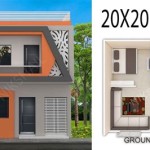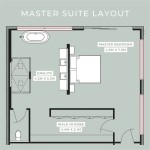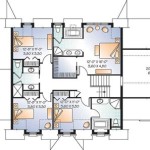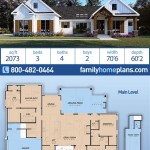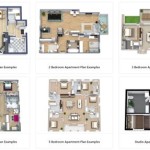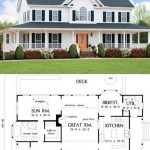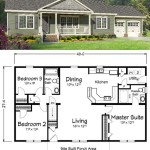House Plans With RV Garages: Combining Home and Adventure
For those who love the open road and the thrill of adventure, an RV is a cherished companion. But storing and maintaining a large recreational vehicle can pose challenges, often requiring dedicated space and careful planning. Combining a house with an RV garage is a practical and stylish solution that caters to both the desire for home comforts and the spirit of exploration. This article explores the benefits of house plans with RV garages, delves into key aspects of RV garage design, and offers valuable considerations for incorporating this feature into your dream home.
The Allure of RV Garages: A Blend of Functionality and Convenience
House plans encompassing RV garages offer a compelling combination of functionality and convenience. The integration of a dedicated space for your RV within your home's design eliminates the need for separate storage facilities, simplifying maintenance and access. Here are prominent advantages of incorporating an RV garage into your home:
- Protection and Security: An RV garage provides a sheltered and secure environment for your valuable investment. It shields your RV from the elements, such as rain, snow, and UV rays, preventing damage and preserving its lifespan.
- Convenience and Access: Having your RV readily accessible within your own property eliminates the hassle of transporting it to and from storage facilities. This convenience allows for spontaneous weekend getaways and hassle-free pre-trip preparations.
- Enhanced Home Value: An RV garage can significantly enhance the value of your property. It adds a unique feature that caters to a growing segment of homebuyers interested in combining homeownership with outdoor recreation.
- Improved Organization: The dedicated space of an RV garage can serve as a central hub for all your outdoor gear, from camping equipment to bikes and kayaks, keeping your home organized and clutter-free.
Design Considerations for RV Garages: Tailoring Space and Functionality
When designing a house with an RV garage, several crucial considerations ensure optimal functionality and aesthetics. These factors contribute to a seamless integration of your RV with your home:
1. Size and Dimensions:
The size of the RV garage must accommodate the dimensions of your current or future RV, with ample clearance for maneuvering and access. The garage's height should also cater to the RV's height, including any rooftop features. Allow for additional space for storage of accessories, tools, and supplies.
2. Door and Entryway:
The garage door should be sufficiently wide and high to accommodate your RV, with ample space for entry and exit. Consider automatic door openers for ease of access and convenience, especially when dealing with larger vehicles. Ensure the entryway is designed to accommodate the RV's length and width, avoiding tight corners or obstructions.
3. Flooring and Drainage:
The RV garage floor should be durable and resistant to heavy loads, moisture, and potential spills. Concrete or epoxy-coated floors are excellent choices for durability and ease of maintenance. Proper drainage is essential to prevent water accumulation and potential damage. Ensure ventilation to prevent moisture buildup.
4. Utilities and Amenities:
Depending on your needs, consider incorporating essential utilities and amenities into your RV garage. These may include electricity and water hookups, a dedicated RV sewer connection, and even a workshop area for maintenance and repairs. The specific amenities depend on your individual requirements and lifestyle.
5. Aesthetics and Integration:
The RV garage should seamlessly integrate into the overall design of your home, maintaining a cohesive aesthetic. Choose materials and finishes that complement the house's style. Consider using natural light, windows, and strategically placed doors to create a welcoming and airy atmosphere within the garage.
Beyond the Basics: Additional Features and Considerations
Beyond the fundamental aspects of RV garage design, several additional features and considerations can elevate the functionality and convenience of this space:
- Workshop Area: A dedicated workshop area within the RV garage allows for maintenance, repairs, and hobby projects. Include storage for tools, equipment, and supplies, along with ample lighting and work surfaces.
- Storage Solutions: Incorporate storage solutions such as shelves, cabinets, and overhead racks to maximize the garage's space. These can hold seasonal items, camping gear, and other recreational equipment.
- Heating and Cooling: Ensure adequate heating and cooling for the RV garage. This provides a comfortable environment for working on the RV, especially during extreme weather conditions. Consider incorporating a mini-split system for efficient climate control.
- Lighting: Well-placed lighting is crucial for safety and functionality within the RV garage. Include overhead lighting, task lighting for specific areas, and motion sensors for added security.
- Security: Invest in security measures such as a security system, motion detectors, and reinforced doors to protect your RV and other valuables stored within the garage.
By carefully considering these aspects, you can create an RV garage that not only meets your practical needs but also seamlessly integrates with your home's design and functionality, enhancing both your living experience and your adventures on the road.

Storage Solutions Rv Garage Plans And More Houseplans Blog Com

Storage Solutions Rv Garage Plans And More Houseplans Blog Com

Viejo 2 Car With Rv Option Dbu Homes

Storage Solutions Rv Garage Plans And More Houseplans Blog Com

Brand New Home With Rv Garage Cool Floorplan Single Story House Floor Plans Craftsman

Rv Garage I Simplicity Homes Oregon Idaho

Storage Solutions Rv Garage Plans And More Houseplans Blog Com

50x48 1 Rv Garage Br 5 Ba Floor Plan 2274 Sq Plans Barndominium Pole Barn House

Plan 006g 0160 The House

6 Rv Garage Plans Debut In New Markets Richmond American Homesrichmond Homes


